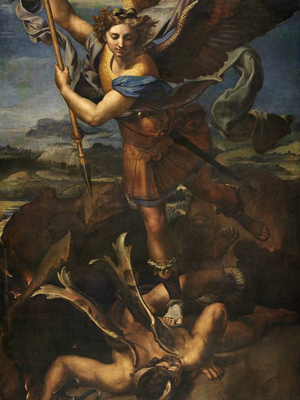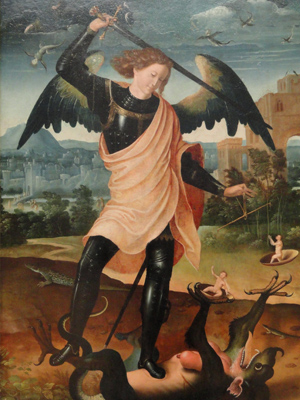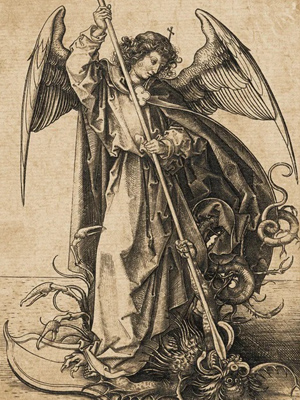Masonic Articles and Essays
Michael and the Dragon
Rudolf Steiner
Date Published:
11/16/2022
In this article Rudolf Steiner, master of symbolism and scholar of the Western Esoteric Tradition, explains the hidden symbolism of the myth of St. Michael and the Dragon
 When we turn our gaze back into earlier times of human evolution, we are inevitably struck with the change that has come about in the pictures man makes for himself — pictures, on the one hand, of Nature, on the other hand, of Spirit. Nor do we need to go back very far to observe the change. As late as the eighteenth century the forces and substances of Nature were thought of in a much more spiritual manner than they are to-day, while spiritual things were conceived more in pictures taken from Nature. It is only in quite recent times that men's ideas of the Spirit have become so utterly abstract and their ideas of Nature been referred to a spirit-estranged matter that human perception cannot hope to penetrate. For the human understanding of the present-day Nature and Spirit fall apart, and men can find no bridge that shall lead over from one to the other.
When we turn our gaze back into earlier times of human evolution, we are inevitably struck with the change that has come about in the pictures man makes for himself — pictures, on the one hand, of Nature, on the other hand, of Spirit. Nor do we need to go back very far to observe the change. As late as the eighteenth century the forces and substances of Nature were thought of in a much more spiritual manner than they are to-day, while spiritual things were conceived more in pictures taken from Nature. It is only in quite recent times that men's ideas of the Spirit have become so utterly abstract and their ideas of Nature been referred to a spirit-estranged matter that human perception cannot hope to penetrate. For the human understanding of the present-day Nature and Spirit fall apart, and men can find no bridge that shall lead over from one to the other.
The consequence is that sublime world-pictures which in past times had great significance for man as he sought to comprehend his place in the Universal Whole have passed completely into the region of things deemed to be no more than airy fancy — mere fancy to which man could only give himself up so long as an exact science was not there to forbid him. Such a cosmic picture is that of Michael fighting with the Dragon.
This picture belongs to a time when man traced back his own evolution quite differently from the way that is taught to-day. To-day as we follow the history of man back into primeval times, we look to find beings less and less human, from whom the man of the present day is descended. We pass from more spiritual to less spiritual beings. In earlier times it was different. Then as men traced back the evolution of mankind, it led them to more spiritual conditions of existence than prevail to-day.
They looked back to a pre-earthly condition when the present form of man did not as yet exist. They pictured to themselves beings in the existence of that time who lived in a finer substance than that of which man is composed to-day. These beings were ‘more spiritual’ than the men of to-day. Of such a nature was the Dragon-being whom Michael fights. He was destined one day in a later age to assume human form. But he must bide his ‘time.’ The time did not depend on him, but on the decree of Spirit-Beings who stood above him. Until that time it was for him to remain entirely within the will of these higher Spirit-Beings.
But now before his hour was come, pride was begotten in him. He wanted to have an “own will” in a time when he should have been still living in the higher Will. Thus did he set himself in opposition to the higher Will. Independence of will was only possible to such beings in a denser matter than then existed. If they persisted in opposition, they must needs change and become different beings. This being found it impossible any longer to live in the same spirituality. His fellow-beings felt his existence in their realm as disturbing, nay even destructive. Michael felt it so. Michael had remained in the Will of the Spirit Beings. He undertook to compel the opposing being to assume the form which was alone possible for an independent will at that stage of the world's development, to assume that is, animal form, the form of the ‘Dragon’, of the ‘Serpent.’ Higher animal forms had not yet made their appearance. This ‘Dragon’ was of course not even then imagined as visible, but as super-sensible.
Such was the picture the man of an earlier time had in his mind of the fight of Michael with the Dragon. For him it was a fact that had taken place before ever there was a Nature visible to the human eye, before even man was, in his present form.
The world we know has proceeded from out of the world in which this event took place. The kingdom into which the Dragon was driven has become ‘Nature,’ and is now so constituted as to be visible to the senses; it is, as it were, in substance the deposit of the earlier world. The kingdom in which Michael has preserved his spirit-devoted will, has remained ‘above’ — purified, like a liquid from which a substance once contained in solution has been deposited. It is a kingdom that must still continue invisible to the senses.
 Nature however, considered apart from man, has not succumbed to the Dragon. The power of the Dragon was not strong enough to come to visibility in Nature. It remained in her as invisible Spirit. The Dragon had to sunder his being from Nature. She became a mirror of the higher spirituality from which he had fallen.
Nature however, considered apart from man, has not succumbed to the Dragon. The power of the Dragon was not strong enough to come to visibility in Nature. It remained in her as invisible Spirit. The Dragon had to sunder his being from Nature. She became a mirror of the higher spirituality from which he had fallen.
Into this world Man was set. He was able to partake in Nature and in the higher spirituality. He became thus a kind of double being. In Nature herself the Dragon remained powerless. In Nature as she comes to life in man, he retains his power. The Nature man receives into himself lives in him as desire, as animal lust. Into this sphere the fallen spirit has entrance. And so we have the ‘Fall of Man.’
The Adversary has found his abode in man. Michael has remained true to his nature. When man turns to Michael with that part of his life which has its origin in the higher spirituality, then there arises in the soul of man the inward fight of Michael and the Dragon.
As recently as the eighteenth century such a conception was still current. External Nature was still to many men the mirror of a higher spirituality, Nature in man still the seat of the Serpent, which the soul must fight through devotion to the power of Michael.
And now, when conceptions of this kind were living in a man's soul, how must he look out upon external Nature? The time of the approach of Autumn must needs recall the fight with the Dragon. The leaves fall from the trees, all the flowering and fruiting life of the plants dies away. In gentle and friendly guise did Nature receive man in Spring; tenderly she cherished him through the long Summer days, nurturing him with the warmth-laden gifts of the Sun. When Autumn comes, she has nothing more to give him. Her forces of decay press in upon him, through his senses he beholds them in pictures. From out of his own being man must give himself what hitherto Nature has given him. Her power grows weaker and weaker within him. From out of the Spiritual he must create for himself forces that shall help where Nature fails. And with Nature the Dragon too loses his power. The picture of Michael rises up before the soul — Michael the opponent of the Dragon. That picture was dimmed, when Nature, and with her the Dragon, was all-powerful. With the oncoming of the frost, the picture looms up again before the soul. Nor must we think of it merely as a picture, it is a reality for the soul. It is as if the warmth of summer had dropped a curtain before the spiritual world, and this curtain were now lifted. Man partakes in the life of the year, he goes with it in its course. Spring is his earthly friend and comforter; but she enmeshes him in that kingdom where the ‘adversary’ sets the ugliness of his invisible power within man over against the beauty of Nature.
With the beginning of autumn appears the spirit of ‘strength in beauty’ the while Nature hides her beauty, driving the adversary too into concealment.
With such thoughts and feelings did men of ancient times keep the Festival of Michael in their hearts.
In the picture of the fight of Michael with the Dragon one thing is clearly and strongly present; that is, the consciousness that man himself must give to his inner life of soul the direction and guidance that Nature cannot give. Our present-day thinking is inclined to mistrust such an idea. We are afraid of becoming estranged from Nature. We want to enjoy her in all her beauty, to revel in her abundance of life, and we are loath to let ourselves be robbed of this enjoyment by admitting that Nature has fallen from the Spiritual. In our striving for knowledge moreover we want to let Nature speak. We fear to lose ourselves in all kinds of fantasy, should we allow the Spirit, that transcends the perception of external Nature, to have a voice concerning the reality of things.
Goethe had no such fear. He found nowhere in Nature any estrangement from the Spirit. He opened his heart to her beauty, to the inner power and might of all that she revealed. In the life of man he felt the presence of much that was inharmonious, much that grated and jarred, or that gave rise to doubt and confusion. And he felt an inner urge and impulse to live in communion with Nature, where the eternal laws of sequence and compensation prevail. Some of his most beautiful poems have sprung from such a life with Nature.
Goethe was however at the same time fully conscious of how the work of man must fulfil and complete the work of Nature. He felt all the beauty of the plants. But he felt too something incomplete in that life which the plant displays before man. In that which weaves and works unseen within the plant, there lay for him far more than manifests itself to the eye within the bounds of visible form. For Goethe, what Nature attains is not the whole. He felt as well what we may call the purposes of Nature. He did not let himself be deterred by the fear of personifying Nature. He knew well that he was not as it were dreaming such purposes into the life of the plant out of any subjective fancy, he beheld them there quite objectively, just as truly as he could behold the colour of the flowers.
This is why he was so indignant when Schiller designated as ‘idea’ and not ‘experience’ the picture Goethe had sketched with a few strokes for his poet friend of the inner striving of the plant towards life and growth. Goethe's reply was that if that were an idea, then he could see ideas with his eyes just as well as he could perceive colours and shapes.
 Goethe was conscious of how there is in Nature not only an ascending but also a descending life. He felt the growth from the seedling to leaf and bud and blossom and fruit; but he felt too how all in turn withers, decays, dries up and dies away. He felt the Spring: but he felt also the Autumn. In Summer he could partake with his own inner sympathy in the unfolding of Nature, but in Winter he could also partake in her death with the same openness of heart.
Goethe was conscious of how there is in Nature not only an ascending but also a descending life. He felt the growth from the seedling to leaf and bud and blossom and fruit; but he felt too how all in turn withers, decays, dries up and dies away. He felt the Spring: but he felt also the Autumn. In Summer he could partake with his own inner sympathy in the unfolding of Nature, but in Winter he could also partake in her death with the same openness of heart.
We may not find in Goethe's works a clear expression in words of this twofold experience with Nature, but we cannot fail to be sensible of it in his whole manner of thought. It is as it were an echo of the experience of Michael's fight with the Dragon. Only, the experience is lifted in Goethe to the consciousness of a later age.
The nineteenth century has not given us any further development of thought on these lines. The new perception of the Spirit that is now being attained must set itself to strive after a continuation and development of Goethe's understanding of Nature.
Our experience of Nature is incomplete as long as we partake in our inner being with her ascending life alone — seed, shoot, leaf, bud, blossom, and fruit. We need to have a feeling also for the withering and dying away. Nor shall we thereby become estranged from Nature. We have not to shut ourselves up from her Spring and her Summer, we have but to enter as well into her Autumn and her Winter.
Spring and Summer require of man that he give himself up to Nature; man lives his way out of himself and into Nature. Autumn and Winter would have man withdraw into his own human domain and set over against the death and decay of Nature the resurrection of the forces of soul and spirit. Spring and Summer are the time of man's Nature-consciousness; Autumn and Winter are the times when he must experience his own human self-consciousness.
As Autumn approaches, Nature withdraws her life into the depths of the Earth; she takes away all sprouting and blossoming far from the sight of man. What she leaves to his view bears within it no fulfilment; therein lies hope, hope for a new Spring to come. Nature leaves man alone with himself.
Then begins the time when it rests upon man to prove by his own forces within him that he is quick and alive and not dead. Summer said to man: I receive your Ego, your ‘I’; I let it bloom in my bosom with the flowers. Autumn begins now to say to man: Descend into the depth of your soul, there to find the forces whereby your ‘I’ may live, the while I hold my life hidden in the depths of the Earth. Goethe resented Haller's thought:
Ins Innere der Natur dringt kein erschaffener Geist;
glückselig, wem sie nur die äussere Schale weist.
No created spirit can penetrate the inner being of Nature;
happy is he to whom she shows even the outer shell.
Goethe's feeling was:
Natur hat weder Kern noch Schale;
alles ist sie mit einem Male.
Nature hath neither shell nor kernel;
Nature is all, and all in one.
Nature has need of death for her life; man can also live this dying through with her. Thereby he enters only more deeply into the inner being of Nature. In his own organism man experiences his breathing process and his blood circulation. They are for him his life. The germinating life of the Spring is in reality as near to man as his own breathing, it entices him out into Nature-consciousness. So too the death and decay of Autumn is in reality no further away from man than his own blood; it steels self-consciousness within him.
The Festival of Self-consciousness, bringing man near to his true humanity — wherever the leaves are falling, there it is solemnized, man only needs to become conscious of it. It is the Festival of Michael, the Festival of the Beginning of Autumn. The picture of “Michael Triumphant” can be there; it can live in man. In Summer man is received lovingly into Nature; but if he would not be deprived of the centre and balance of his being, he must not lose himself in her but be able to rise up in Autumn in the strength and might of his own spirit-being. Then will the picture of Michael Triumphant live within him.
More Masonic Articles
Explore articles and essays written by Freemasons about Freemasonry.
Read More
Membership
Interested in becoming a member of the worlds oldest Fraternal organization?
Read More